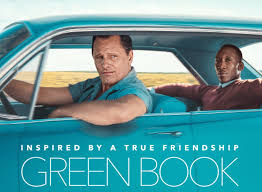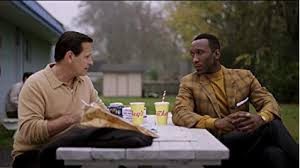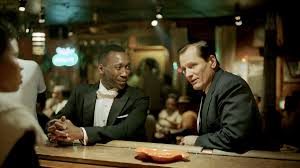
A bigoted night club bouncer is hired to be the driver of an African-American pianist on a tour of the segregated deep south of the early 1960’s.
In what would turn out to be one of the more controversial winners in years, Green Book took home the Academy’s highest honor. Based on a true story, it’s a movie that, on its surface, appears to be a story of overcoming prejudice and learning to appreciate people as individuals and treating them with empathy became embroiled in controversy over its production, the misbehavior of some of the talent involved and disagreements over the portrayal of the real-life characters.

All of the controversy will serve as a backdrop for what will ultimately be this film’s story. It is forever relegated to the long line of “controversial” winners, which is a long and storied line in Oscar history, and dates all the way back the Oscar’s earliest years (I’m looking at you, The Broadway Melody). This debate will likely rage on for some time, and for my part, I’ll add to it by saying that I liked the film very much. I watched it before hearing anything of the controversy surrounding it, and on its merits, I considered it one of the top five films of the year. The acting was terrific, the screenplay was well structured and well-written, proven out by the fact that it won the Oscar for Best Original Screenplay. I felt the direction was subtle and nuanced in a way that captured the emotion of the film without being heavy-handed.
One of the criticisms of Green Book is that it’s essentially Driving Miss Daisy redux, and that point needs to be addressed. You can see my review of Driving Miss Daisy here, but in a nutshell, I was not a fan of that film. Sure, it was a feel-good movie, and it helped catapult Morgan Freeman’s career to levels it previously hadn’t seen, but it was not the best picture of the 1989, and if we’re being honest, it wasn’t a very good film over all. There were plenty of examples throughout the film where screenwriter Alfred Uhry and Director Bruce Beresford had opportunities to inject serious drama and tension in to the story and they always, always, and without exception failed to do so. As I pointed out in that blog post, it was almost as though Uhry and Beresford loved their characters too much to put them in uncomfortable positions. However, Green Book Director Peter Farrelly and co-writers Nick Vallelonga and Brian Currie had no such inhibitions.
Here’s a perfect example of the differing dynamics between the two films. There is a sequence in Driving Miss Daisy where Hoke has to drive Daisy to some relations in Mississippi. On the way, they’re pulled over by two state troopers, and after some initial back and forth where the officers chide Hoke for driving this car and ask where he got it from, despite the fact the Daisy is clearly sitting in the back seat, it’s determined that the car is Daisy’s and Hoke is driving her and the officers let them go before lamenting the fact privately between each other that a black man is allowed to drive a Jewish woman around without repercussions. That’s all. That’s it. There’s nothing more to it. Now, there’s a similar scene in Green Book where Tony (Viggo Mortensen) and Dr. Shirley (Mahershala Ali) are driving through Alabama and get pulled over by police on a rainy night. Since Dr. Shirley is African-American, he’s not allowed to be out after dark, and that’s why they’ve been pulled over. The lead trooper instructs his partner to pull Dr. Shirley from the car and some very tense moments ensue. The scene builds to a crescendo when the lead trooper insults Tony’s Italian heritage and Tony punches the cop out, leading to both of them being arrested. If you’re a screenwriter and you’ve taken David Freeman’s excellent course, Beyond Structure, then you know that the cop was “slamming” Tony. He was verbally attacking the very weakness that Tony has, leading Tony to react in the worst way possible.

So here we have two films that have similar circumstances and put their characters in similar situations, but handled those situations in wildly divergent manners. Driving Miss Daisy simply let its characters off the hook after a few tense moments, practically telegraphing to the audience not to worry because Hoke and Daisy are going to be just fine. Neither one of them needed to do anything extraordinary. The police, realizing Hoke and Daisy weren’t doing anything wrong, simply let them go. There was nothing proactive that Hoke or Daisy did that got them out of the situation. On the other hand, in Green Book, a similar encounter with police yielded vastly different, and much more dramatic results. The police were much more aggressive in this encounter. They were almost looking for trouble and they provoked Tony into being proactive. In fact, they provoked him into the most flawed trait of his character; the one that resorts to violence to solve his problems. In so doing, they put them into an even worse situation than he and Dr. Shirley were already in. Instead of allowing Tony and Dr. Shirley to go along their merry way, the stakes were raised. The next time we see them, they’re sitting in a jail cell with no reasonable expectation of getting out until Dr. Shirley uses his guile and his brain to get them out of the situation that Tony’s muscle could not, and had in fact made worse. The latter is a much better example of good story telling because it built the drama and the tension whereas the former diffused it.
Another reason that Green Book’s approach to this situation was better is because it forces the story to build in the next scene. Now Dr. Shirley and Tony have to figure out a way to get out of jail so that Dr. Shirley can make it on time to his next and final performance of the tour. In Driving Miss Daisy, Hoke and Daisy were simply on to her relatives’ home as though nothing else had happened. In Green Book, the stakes have been raised and now there is real concern on the part of the audience that they’re going to be stuck. Here’s where Green Book showed its superior depth by having Dr. Shirley chastise Tony for only resorting to violence and implores him to never lose his dignity. This line of the story will manifest itself during the climax when Tony has an opportunity to resort to violence, but that time Dr, Shirley is able to stop him.
This leads me to one of the controversies surrounding this film and that is its take on race relations. One of the criticisms is that Dr. Shirley needed a “white savior” and by focusing on Tony as the main character, we lose the full impact that southern segregation had on Shirley.

In fact, I found the opposite to be true, and I feel that point of view is short-sighted and misses some important context in this film. Certainly, there are a couple of moments throughout Act II where Tony has to come to Shirley’s rescue. Forgetting for a moment that one of the points that Shirley made when he first hired Tony to the job was that he’d need someone with Tony’s particular talents, meaning he needed his muscle in order to navigate the South, we have a symbiotic relationship between these two characters. Yes, Tony’s muscle is able to save Dr. Shirley a couple of times, a-la a knight in shining armor. But let’s not forget that the case could be made that Dr. Shirley saves Tony’s soul. Tony starts the film as a bigoted muscle head who is only marginally present for his wife and children. His simple background has stunted his intellectual and emotional growth, so he doesn’t know how to communicate with his wife and he’s reluctant to openly show her affection. After going on this journey with Dr. Shirley, and in true Hero’s Journey fashion, Tony returns to his Ordinary World a changed person with new knowledge and a broader point of view of the world. That notion has also been criticized as using Dr. Shirley as nothing more than a trope to assist Tony in his character growth. That is another short-sighted point of view because Dr. Shirley grows and changes as well. He goes through his own personal journey where Tony teaches him to be more comfortable in his own skin. Whereas Tony’s inner journey required him to accept a changing world and to be worldlier, Dr. Shirley’s was a journey of self-discovery and one where he needs to find his place in the world. He doesn’t need to shun his ethnicity, as he’s been trying to do his whole life. He doesn’t need to shun his sexuality, as he’s been doing his whole life. He just needs to be comfortable with who he is and to appreciate how he got here, and he wouldn’t have been able to do that if not for going on this journey with Tony. Dr. Shirly is not here just to motivate the change in Tony. Dr. Shirley goes through his own metamorphosis and is a different character at the end of the story than he was at the beginning. Ultimately, they end the story as equals, and equality is what we should be striving for.

Did the Academy get it right?
With all of the controversy surrounding the film, it’s hard to say that they did. Spike Lee was apparently so angry at the announcement that he got up and attempted to leave the theater before the acceptance speeches had been completed. Others have called into question the film’s accuracy in portraying these events, as it was based on a true story. There were other controversies surrounding the production that I’ll not get into now, but I will say this. Green Book is a wonderful film, and compared to the other films that were nominated against it, it is at least as worthy of being recognized as the best film of the year as any of them. Spike Lee’s BlackkKlansman was a very good film that was also based on a true story. It was a tense, riveting and unbelievable, yet true story about a black man who infiltrated the Ku Klux Klan. What keeps it a notch below Green Book for me is that John Stallworth, the main character, ends the film in much the same way he began it. There was little to no growth in his character and he had very few noticeable flaws. But it was an important film to be made and Spike Lee was the only director who could have made it. I understand why Black Panther was nominated, but I didn’t agree with the nomination. In fact, Black Panther wasn’t even the best Marvel movie to come out in 2018. The Avengers: Infinity War was more emotional, had better actions, more interesting characters, and was all around a better made movie. Vice tried to do too much and I believe Director Adam McKay tried to get a little too cute and tried to draw too much attention to himself, which was ultimately to the detriment of a fascinating story that included a sublime performance from Christian Bale as Vice President Dick Cheney. I was very disappointed with Roma, and found it to be underwhelming. Similarly to Driving Miss Daisy, it fell into the trap of approaching drama, but rarely paying it off. It was a year in the life of these people, and the character work was nice. It had beautiful cinematography and wonderful editing, but story-wise it was a mess. I loved The Favourite, and felt that Director Yorgos Lanthimos effectively channeled his inner Stanley Kubrick to give us a thoughtful tale with the hard lessons of being careful what you wish for. I was mildly surprised that Bohemian Rhapsody didn’t win. I’ve always been a fan of the music of Queen and I thought the film did a good job of dramatizing Freddie Mercury, who remains one of the great frontmen in the history of Rock music. A Star is Born was my personal favorite film of the year. From a pure production standpoint, it had everything that it needed. It had deep and compelling characters and it had a story that was both riveting and entertaining and ended up being emotionally satisfying, and it would have received my vote, had I had one. That said, I’m happy Green Book won. I liked it just a tick less than A Star is Born and the acting and storytelling in it made for terrific cinema.
Should you see it?
Only if you love great acting, emotional storytelling and thoughtful narratives. Another criticism of this film is that it was clearly Oscar-bait. Well, if that means they tried to make a good movie, then they succeeded. This film is worth your time. It might not be for everyone, but it’s a rich story with characters that you can fall in love with and root for. Based on that alone, it’s worth your time.
Great review as always, Brian. I haven’t seen “Green Book” yet, but this just increases my desire to do so (it’s in my library queue). Your insights and thoughts match what I’ve read from some of the more objective critics, so I’m really looking forward to seeing it. And I totally agree with you about “Black Panther.” While I enjoyed it, I had a couple of problems with the writing, and I thought “Infinity War” was a much more powerful and emotional film. In fact, I think it ranks as one of the greatest fantasy films ever made. And nice shout-out to my buddy David Freeman, one of the best screenwriting teachers in town!